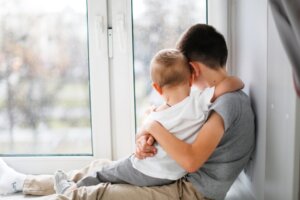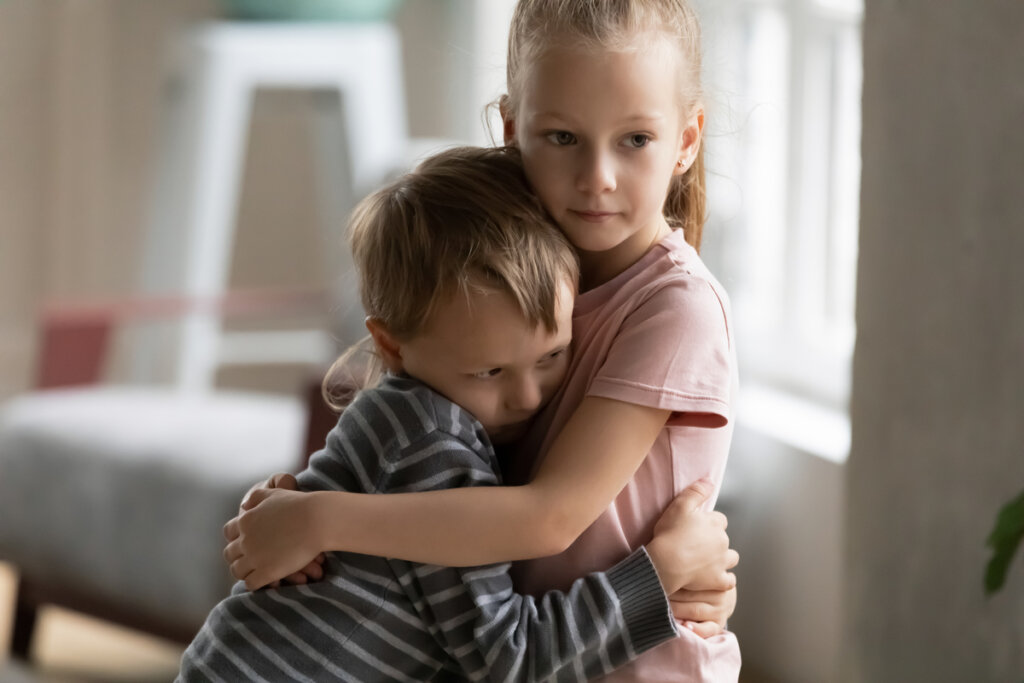Siblings Who Have to Act as Parents

Some parents make the mistake of giving responsibilities to their children that don’t belong to them. It often involves the care of younger siblings. In fact, they frequently end up becoming a kind of ‘second parent’.
This type of behavior is also often reinforced by other adults. The children might be told, “You have to take care of your little brother” as if it were their responsibility. In effect, they’re given the role of their caretaker.
Having been on the receiving end of this kind of message time and again, the child ends up assuming that role. They start to think that, as everyone tells them it’s their job, then it must be. Consequently, many parents end up shaping a child who’s perfect on the outside but broken on the inside.
In other cases, the pressure can be such that the child rebels against that idea. Thus, far from protecting and caring for their sibling, they end up attacking them. That’s because they can find no other way of dealing with a responsibility that they just can’t handle.
“To the outside world we all grow old. But not to brothers and sisters. We know each other as we always were. We know each other’s hearts. We share private family jokes. We remember the family feuds and secrets, family griefs and joys. We live outside the touch of time.”
-Clara Ortega-

Older siblings and their responsibilities
When children are six or seven years older than their younger siblings, this tendency will most likely appear almost naturally. Of course, once adults identify it, it tends to be reinforced. Nevertheless, depending on how and when they do it, they may achieve precisely the opposite effect to what they intended and the sibling stops acting as a caregiver unless they understand that they’re going to be rewarded for it.
Depending on how dedicated they are, the caregiving child might display an extraordinarily vigilant attitude, preventing their sibling from making mistakes, thus learning and gaining autonomy themselves. However, education is a complex task that only an adult should ever take on.
Between responsibility and fear
Older siblings aren’t always comfortable with the arrival of another child in the house, especially if they’re young themselves. Nevertheless, parents often refuse to see this reality, assuming that the sibling will naturally act as a protector of the newcomer.
The child will often be afraid to contradict and upset their parents or not live up to their expectations. That’s why they try to fulfill the role they’re assigned, even if they don’t like it.
It’s not uncommon for them to begin to feel that anything negative that happens to their sibling is, in one way or another, their fault. They fear that their parents will stop loving them if they don’t fully comply with the task that’s been entrusted to them. Over time, they become adults who don’t recognize their own needs and who tend to take on problems that don’t belong to them as their own.

The problems surrounding siblings who have to act as parents
There are certain demands that should never be made of a minor. The first of them is replacing a parent. It’s not a child’s responsibility to ensure the welfare of their sibling. This function must be left to another adult if the parents are unable to perform it.
Older siblings also shouldn’t have to systematically prioritize the satisfaction of their sibling’s needs over their own. They should be allowed to do it as and when they choose.
Education largely consists of children internalizing the importance of civic behavior. However, there’s a huge difference between this and having to be a model for their sibling.
All cited sources were thoroughly reviewed by our team to ensure their quality, reliability, currency, and validity. The bibliography of this article was considered reliable and of academic or scientific accuracy.
- Chávez, J. (2020). Riesgos psicosociales que conlleva la responsabilidad del rol de tipo parental en el proyecto de vida de adolescentes hermanos mayores.
- Merino, L., & Martínez-Pampliega, A. (2020). La relación entre hermanos/as y su adaptación en contextos de alto estrés familiar. Ansiedad y Estrés, 26(1), 27-32.
This text is provided for informational purposes only and does not replace consultation with a professional. If in doubt, consult your specialist.








